The SRU Political Science Department sponsored a roundtable discussion of the presidential election Thursday night in the Smith Student Center Theater.
Dr. Dan McIntosh and Dr. Sharon Sykora of the political science department led the discussion. Dr. Cindy LaCom of the gender studies program, Dr. Itzi Meztli, English department, Dr. Christine Pease-Hernandez, communication department, Dr. Julie Snow, of the geography, geology, and environmental departments, Dr. Aksel Casson, anthropology department, Dr. Colleen Cooke, recreational therapy department, Dr. Katherine Cooklin, philosophy department, Dr. Catherine Massey, psychology department and Dr. Kurt Schimmel, business department, also sat on the panel of faculty.
The faculty had four major goals of the discussion that they wished to address and sparked educated, respectful conversation with students. The faculty panelists expressed a desire for people to understand how Donald Trump won the election, since most pollsters and pundits projected Clinton to win. They wanted to assess the potential impact of Trump’s election on marginalized groups. They also discussed the Trump administration’s policies including domestic, foreign, environmental and trade policy. Finally, the faculty wanted students to think of the implications this might have on the SRU campus.
The biggest question of all for most people was addressed first. How, and why, did Hillary Clinton lose? Schimmel discussed how Trump used branding to get his message across to people.
“I think he connected on more of an emotional level with people than Hillary did,” Schimmel said. “He beat her on branding, especially with the ‘Crooked Hillary’ image to most people. He connected with those rural areas of people, while Hillary focused more on the urban areas.”
Elections are won not just on issues, but winning over the majority of people while addressing those concerns at the same time, LaCom said. Hillary had the lead for a while, but Trump got the necessary rural areas to win, LaCom said. Winning the rural states and the electoral votes that go with them is how candidates win elections, McIntosh said.
Metzli said how the electoral system is flawed in his opinion, and appeals to only certain people. This began a series of questions related to the electoral college, and how Trump stated he wanted to get rid of it on Twitter.
“The whole election system is rigged,” Metzli said. “That system appeals to white males in those types of states, like New Hampshire, Iowa and Vermont.”
The electoral college is designed for a specific reason, and it will be hard fro Trump to change that, McIntosh said. The system is designed to give greater representation to certain states, and that power is delegated as the system sees fit, McIntosh said.
As the conversations began to become more argumentative, Sykora assured everyone that the faculty’s goal was to stay bipartisan.
“We are professionals representing our disciplines, and we are not trying to be partisans,” Sykora said.
Trump brought up the phrase “Make America Great Again,” which didn’t sit well with some members of the audience. Metzli was not the biggest fan of this phrase and interpreted it in a different way,
“He wanted to make America white again,” Metzli said. “That phrase leaves out a lot of people, especially Latinos, African-Americans and the LGBT communities.”
The idea behind this was to make certain areas which he campaigned in great again, McIntosh said. It wasn’t all parts of the country, because most urban centers are doing well, McIntosh said.
“His idea was to make rural America great again, but the reality is it won’t happen,” McIntosh said. “There is just no market for those industries, especially the steel industry.”
The conversation then turned to Trump’s views on global warming and the environment, which he has said isn’t real. Snow, who has been a climate scientist for many years, discussed her opinions on his views and what the repercussions might be.
“He doesn’t think climate is changing, and believes it is a hoax created by China,” Snow said. “97 percent of climate and environmental scientists agree that it is happening, and happening fast. Trump has put forth Myron Ebell to lead the EPA, and Ebell is one of the biggest climate-changing deniers in the world. Trump is also going to try and pull out of the Paris Agreement, which could be catastrophic to the U.S.”
The basis of the Paris Agreement is is cut back on CO2 emissions by 15 percent, and most major countries are in the agreement, Snow said. The Earth’s temperature has been increasing for years now, and once it hits the two-degree threshold it will be devastating to human life, Snow said.
“In the 13 years I have been here, it has already gone up one degree,” Snow said. “That rate is growing faster and faster, and who knows what might happen in the next four years with Trump in office. People need to realize that using that money from the EPA won’t do much, it constitutes less than one percent of the debt.”
Casson said how Trump being elected will impact the balance of power within the global community. His views on policies when it comes to global trade and foreign policies will allow for other countries power to grow, Casson said.
“This will create an opportunity for Russia’s already-large amount of power to continue to increase,” Casson said.
Finally, the discussion neared its end, and Sykora asked for Pease-Hernandez’s opinion on what SRU students should do on campus.
“You all sat here and observed the panel, we agreed on things and didn’t on others,” Pease-Hernandez said. “No matter what we were civilized and respectful of each other’s views. We need to be able to talk to one another and voice our opinions. Engage and learn to talk with one another, and realize that people have different views as you.”
“I’m a lesbian and my father supports Trump, but I still love my father to death,” Massey said. “Love is what we need in times like this.”








